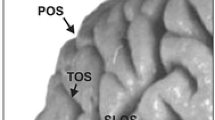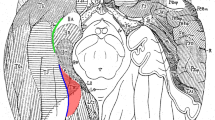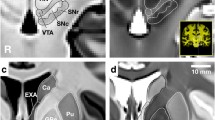Abstract
Probabilistic maps of neocortical areas and subcortical fiber tracts, warped to a common reference brain, have been published using microscopic architectonic parcellations in ten human postmortem brains. The maps have been successfully applied as topographical references for the anatomical localization of activations observed in functional imaging studies. Here, for the first time, we present stereotaxic, probabilistic maps of the hippocampus, the amygdala and the entorhinal cortex and some of their subdivisions. Cytoarchitectonic mapping was performed in serial, cell-body stained histological sections. The positions and the extent of cytoarchitectonically defined structures were traced in digitized histological sections, 3-D reconstructed and warped to the reference space of the MNI single subject brain using both linear and non-linear elastic tools of alignment. The probability maps and volumes of all structures were calculated. The precise localization of the borders of the mapped regions cannot be predicted consistently by macroanatomical landmarks. Many borders, e.g. between the subiculum and entorhinal cortex, subiculum and Cornu ammonis, and amygdala and hippocampus, do not match sulcal landmarks such as the bottom of a sulcus. Only microscopic observation enables the precise localization of the borders of these brain regions. The superposition of the cytoarchitectonic maps in the common spatial reference system shows a considerably lower degree of intersubject variability in size and position of the allocortical structures and nuclei than the previously delineated neocortical areas. For the first time, the present observations provide cytoarchitectonically verified maps of the human amygdala, hippocampus and entorhinal cortex, which take into account the stereotaxic position of the brain structures as well as intersubject variability. We believe that these maps are efficient tools for the precise microstructural localization of fMRI, PET and anatomical MR data, both in healthy and pathologically altered brains.




Similar content being viewed by others
References
Aggleton JP (2000) The amygdala: a functional analysis. Oxford University Press, Oxford
Amaral DG, Insausti R (1990) Hippocampal formation. In: Paxinos G (ed) The Human Nervous System. Academic Press, San Diego, CA, pp 755
Amunts K, Schleicher A, Bürgel U, Mohlberg H, Uylings HBM, Zilles K (1999) Broca’s region revisited: cytoarchitecture and intersubject variability. J Comp Neurol 412:319–341
Amunts K, Weiss PH, Mohlberg H, Pieperhoff P, Gurd J, Shah JN, Marshall CJ, Fink GR, Zilles K (2004) Analysis of the neural mechanisms underlying verbal fluency in cytoarchitectonically defined stereotaxic space—the role of Brodmann’s areas 44 and 45. Neuroimage 22:42–56
Amunts K, Zilles K (2001) Advances in cytoarchitectonic mapping of the human cerebral cortex. In: Naidich TP, Yousry TA, Mathews VP (eds) Neuroimaging clinics of North America Anatomic basis of functional MR imaging. Harcourt, Philadelphia, pp 151–169
Becker T, Elmer K, Schneider F, Grodd W, Bartels M, Heckers S, Beckmann H (1996) Confirmation of reduced temporal limbic structure volume on magnetic resonance imaging in male patients with schizophrenia. Psychiatry Res 67:135–143
Blaizot X, Martinez-Marcos A, del Mar Arroyo-Jimenez M, Marcos P, Artacho-Pérula E, Munoz M, Chavoix C, Insausti R (2004) The parahippocampal gyrus in the baboon: Anatomical, cytoarchitectonic and magnetic resonance imaging (MRI) studies. Cereb Cortex 14:231–246
Blinkov SM, Glezer II (1968) Das Zentralnervensystem in Zahlen und Tabellen. Fischer, Jena
Bobinski M, deLeon MJ, Convit A, DeSanti S, Wegiel J, Tarshish CY, Saint Louis LA, Wisniewski HM (1999) MRI of entorhinal cortex in mild Alzehimer’s disease. The Lancet 353:38–40
Bogerts B (1997) The temporolimbic system theory of positive schizophrenic symptoms. Schizophr Bull 23:423–434
Bozkurt A, Kamper L, Stephan KE, Kötter R (2001) Organization of primate amygdalo-prefrontal projections. Neurocomputing 38–40:1135–1140
Braak H (1972) Zur Pigmentarchitektonik der Großhirnrinde des Menschen I Regio entorhinalis. Z Zellforsch 127:407–438
Brett M, Johnsrude IS, Owen AM (2002) The problem of functional localization in the human brain. Nat Rev Neurosci 3:243–249
Brierley B, Shaw P, David AS (2002) The human amygdala: a systematic review and meta-analysis of volumetric magnetic resonance imaging. Brain Res Rev 39:84–105
Brockhaus H (1938) Zur normalen und pathologischen Anatomie des Mandelkerngebietes. J Psychol Neurol 49:1–136
Brockhaus H (1940) Die Cyto- und Myeloarchitektonik des Cortex claustralis und des Claustrum beim Menschen. J Psychiat Neurol 49:249–348
Collins DL, Neelin P, Peters TM, Evans AC (1994) Automatic 3D intersubject registration of MR volumetric data in standardized Talairach space. J Comp Ass Tomog 18:192–205
Conrad AJ, Abebe T, Austin R, Forsythe S, Scheibel AB (1991) Hippocampal pyramidal cell disarray in schizophrenia as a bilateral phenomenon. Arch Gen Psychiatry 48:413–417
Duvernoy H (1988) The Human Hippocampus. An Atlas of Applied Anatomy. J.F. Bergmann Verlag, München
Eickhoff S, Stephan KE, Mohlberg H, Grefkes C, Fink GR, Amunts K, Zilles K (2005) A new SPM toolbox for combining probabilistic maps and functional imaging data. Neuroimage 25:1325–1335
Evans AC, Collins DL, Mills SR, Brown ED, Kelly RL, Peters TM (1993) 3D statistical neuroanatomical models from 305 MRI volumes. Proceedings of the IEEE-NSS-M1 Symposium, pp 1813–1817
Habel U, Klein M, Shah NJ, Toni I, Zilles K, Falkai P, Schneider F (2004) Genetic load on amygdala hypofunction during sadness in nonaffected brothers of schizophrenia patients. Am J Psychiatry 161:1806–1813
Harding AJ, Halliday GM, Kril JJ (1998) Variation in hippocampal neuron number with age and brain volume. Cereb Cortex 8:710–718
Harding AJ, Stimson E, Henderson JM, Halliday GM (2002) Clinical correlates of selective pathology in the amygdala of patients with Parkinson’s disease. Brain 125:2431–2445
Hardy T, Brynildson LR, Gray YG, Spurlock D (1992) Three-dimensional whole-brain mapping. Stereotact Funct Neurosurg 58:143
Haug H (1980) Die Abhängigkeit der Einbettungsschrumpfung des Gehirngewebes vom Lebensalter. Verh Anat Ges 74:699–700
Heimer L (2000) Basal forebrain in the context of schizophrenia. Brain Res Rev 31:205–235
Heimer L, de Olmos JS, Alheid GF, Pearson J, Sakamoto N, Shinoda K, Marksteiner J, Switzer RC (1999) The human basal forebrain Part II The primate nervous system, Part III. Elsevier, pp 57–226
Heinsen H, Gössmann E, Rüb U, Eisenmenger W, Bauer M, Ulmar G, Bethke B, Schüler M, Schmitt H-P, Götz M, Lockermann U, Püschel K (1996) Variability in the human entorhinal region may confound neuropsychiatric diagnoses. Acta Anat 157:226–237
Heiss WD, Habedank B, Klein JC, Herholz K, Wienhard K, Lenox M, Nutt R (2004) Metabolic rates in small brain nuclei determined by high-resolution PET. J Nucl Med 45:1811–1815
Henn S, Schormann T, Engler K, Zilles K, Witsch K (1997) Elastische Anpassung in der digitalen Bildverarbeitung auf mehreren Auflösungsstufen mit Hilfe von Mehrgitterverfahren. In: Paulus E, Wahl FM (eds) Mustererkennung. Springer, Berlin, pp 392–399
Holmes CJ, Hoge R, Collins L, Woods R, Toga AW, Evans AC (1998) Enhancement of MR images using registration for signal averaging. J Comp Ass Tomog 22:324–333
Hurlemann R, Matusch A, Eickhoff S, Palomero-Gallagher N, Meyer PT, Boy C, Maier W, Zilles K, Amunts K, Bauer A (2005) Analysis of neuroreceptor PET data based on cytoarchitectonic maximum probability maps—a feasibility study. Anat Embryol this volume
Insausti R, Juottonen K, Soininen H, Insausti AM, Partanen K, Vainio P, Laakso MP, Pitkänen A (1998) MR volumetric analysis of the human entorhinal, perirhinal, and temporopolar cortices. Am J Neurorad 19:659–671
Irwin W, Anderle MJ, Abercrombie HC, Schaefer SM, Kalin NH, Davidson RJ (2004) Amygdalar interhemispheric functional connectivity differs between the non-depressed and depressed human brain. Neuroimage 21:674–686
Kiefer C, Slotboom J, Buri C, Gralla J, Remonda L, Dierks T, Strik WK, Schroth G, Kalus P (2004) Differentiating hippocampal subregions by means of quantitative magnetization transfer and relaxometry: preliminary results. Neuroimage 23:1093–1099
Kretschmann H-J, Wingert F (1971) Computeranwendungen bei Wachstumsproblemen in Biologie und Medizin. Springer, Berlin Heidelberg New York
Krimer LS, Hyde TM, Herman MM, Saunders RC (1997) The entorhinal cortex: an examination of cyto- and myeloarchitectonic organization in humans. Cereb Cortex 7:722–731
Ledoux JE (2000) The amygdala and emotion: a view through fear. In: Aggleton JP (ed) The amygdala. A functional analysis. Oxford University Press, Oxford, pp 289–310
Lepage M, Habib R, Tulving E (1998) Hippocampal PET activations of memory encoding and retrieval: the HIPER model. Hippocampus 8:313–322
Merker B (1983) Silver staining of cell bodies by means of physical development. J Neurosc Meth 9:235–241
Mohlberg H, Lerch J, Amunts K, Evans AC, Zilles K (2003) Probabilistic cytoarchitectonic maps transformed into MNI space. Neuroimage CD rom: Ninths international conference on functional mapping of the human brain, New York
Narr KL, Thompson PM, Szeszko P, Robinson D, Jang S, Woods RP, Kim S, Hayashi KM, Asunction D, Toga AW, Bilder RM (2004) Regional specificity of hippocampal volume reductions in first-episode schizophrenia. Neuroimage 21:1563–1575
Nelson MD, Saykin AJ, Flashman LA, Riordan HJ (1998) Hippocampal volume reduction in schizophrenia as assessed by magnetic resonance imaging: a meta-analytic study. Arch Gen Psychiatry 55:433–440
Nieuwenhuys R, Voogt J, van Huijzen C, Lange W (1988) The human central nervous system. A synposis and atlas. Springer, Berlin Heidelberg New York
Nordahl TE, Kusubov N, Carter C, Salamat S, Cummings AM, O’Shora-Celaya L, Eberling J, Robertson L, Huesman RH, Jagust W, Budinger TF (1996) Temporal lobe metabolic differences in medication-free outpatients with schizophrenia via the PET-600. Neuropsychopharmacol 15:541–554
Phelps EA (2004) Human emotion and memory: interactions of the amygdala and hippocampal complex. Curr Opin Neurobiol 14:198–202
Pierantozzi M, Mazzone P, Bassi A, Rossini PM, Peppe A, Altibrandi MG, Stefani A, Bernardi G, Stanzione P (1999) The effect of deep brain stimulation on the frontal N30 component of somatosensory evoked potentials in advanced Parkinson’s disease patients. Clin Neurophysiol 110:1700–1707
Pikkarainen M, Pitkänen A (2001) Projections from the lateral, basal and accessory basal nuclei of the amygdala to the perirhinal and postrhinal cortices in rat. Cereb Cortex 11:1064–1082
Pitkänen A, Kelly JL, Amaral DG (2002) Projections from the lateral, basal, and accessory basal nuclei of the amygdala to the entorhinal cortex in the macaque monkey. Hippocampus 12:186–205
Pruessner JC, Köhler S, Crane J, Pruessner M, Lord C, Byrne A, Kabani N, Collins DL, Evans AC (2002) Volumetry of temporopolar, perirhinal, entorhinal and parahippocampal cortex from high-resolution MR images: Considering the variability of the collateral sulcus. Cereb Cortex 12:1342–1353
Roland PE, Zilles K (1994) Brain atlases—a new research tool. Trends Neurosci 17:458–467
Rosene DL, van Hoesen GW (1987) The hippocampal formation of the primate brain. A review of some comparative aspects of cytoarchitecture and connections. In: Jones EG, Peters A (eds) Further aspects of cortical function, including hippocampus. Plenum, New York, pp 345–456
Schacter DL, Wagner AD (1999) Medial temporal lobe activations in fMRI and PET studies of episodic encoding and retrieval. Hippocampus 9:7–24
Schneider F, Weiss U, Kessler C, Salloum JB, Posse S, Grodd W, Müller-Gärtner H-W (1998) Differential amygdala activation in schizophrenia during sadness. Schizophr Res 34:133–142
Schormann T, Zilles K (1998) Three-dimensional linear and nonlinear transformations: an integration of light microscopical and MRI data. Hum Brain Mapp 6:339–347
Simic G, Kostovic I, Winblad B, Bogdanovic N (1997) Volume and number of neurons of the human hippocampal formation in normal aging and Alzheimer disease. J Comp Neurol 379:482–494
Skullerud K (1985) Variations in the size of the human brain. Acta Neurol Scand 71:1–94
Stephan H (1975) Allocortex. In: Bargmann W (ed) Handbuch der mikroskopischen Anatomie des Menschen. Springer-Verlag, Berlin Heidelberg New York, pp 339–401
Swanson LW, Petrovich GD (1998) What is the amygdala? Trends Neurosci 21:323–331
Talairach J, Tournoux P (1988) Coplanar stereotaxic atlas of the human brain. Thieme, Stuttgart
Thompson PM, Hayashi KM, de Zubicaray GI, Janke AL, Rose SE, Semple J, Hong MS, Herman DH, Gravano D, Doddrell DM, Toga AW (2004) Mapping hippocampal and ventricular change in Alzheimer disease. Neuroimage 22:1754–1766
van Erp TGM, Saleh PA, Huttunen M, Lonnqvist J, Kaprio J, Salonen O, Valanne L, Poutanen VP, Standerskjold-Nordenstam CG, Cannon TD (2004) Hippocampal volumes in schizophrenic twins. Arch Gen Psych 61:346–353
Vierordt H (1893) Anatomische, physiologische und physikalische Daten und Tabellen zum Gebrauch für Mediziner. Fischer Verlag, Jena
Wright IC, Rabe-Hesketh S, Woodruff PWR, David AS, Murray RM, Bullmore ET (2000) Meta-Analysis of regional brain volumes in schizophrenia. Am J Psychiatry 157:16–25
Zilles K, Schleicher A, Palomero-Gallagher N, Amunts K (2002) Quantitative analysis of cyto- and receptor architecture of the human brain. In: Mazziotta JC, Toga A (eds) Brain mapping: the methods. Elsevier, Amsterdam, pp 573–602
Acknowledgments
This Human Brain Project/Neuroinformatics research is funded by the National Institute of Biomedical Imaging and Bioengineering, the National Institute of Neurological Disorders and Stroke, and the National Institute of Mental Health. Further support by Deutsche Forschungsgemeinschaft (Schn 362/13-1 and 13-2), the BMBF (BMBF 01GO0104), Brain Imaging Center West (BMBF 01GO0204) and the Helmholtz Gemeinschaft (VH-NG-012) is gratefully acknowledged.
Author information
Authors and Affiliations
Corresponding author
Rights and permissions
About this article
Cite this article
Amunts, K., Kedo, O., Kindler, M. et al. Cytoarchitectonic mapping of the human amygdala, hippocampal region and entorhinal cortex: intersubject variability and probability maps. Anat Embryol 210, 343–352 (2005). https://doi.org/10.1007/s00429-005-0025-5
Published:
Issue Date:
DOI: https://doi.org/10.1007/s00429-005-0025-5




